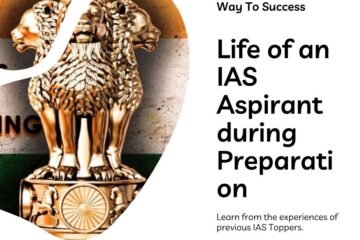How much time one should ideally devote to mains?
| Tables Of Content |
|---|
| Strategy |
| Other aspects that require management: |
| Courses Offered By APTIPLUS (Best IAS Coaching in Kolkata) |
Every year about a million aspirants register themselves for the most prestigious exam of the country but only 0.001% make it to the final list. BUT there are some who make it to this 0.001% not once but thrice and even more. Ever wondered why these aspirants crack the exam so many times while a few struggle to clear the prelims after so many years???
The simple answer is that they manage their preparation very effectively.
Management is a process of planning, decision making, organizing, leading, motivation and controlling the human resources, financial, physical, and information resources of an organization to reach its goals efficiently and effectively.
There are a number of aspects of UPSC CSE Preparation that need to be management effectively to ace this examination. Successful candidates do not divide the preparation process. The most-costly mistake aspirants make is dividing the preparation process between prelims and mains. The CSE preparation is a simultaneous process. Successful candidates follow this religiously. They cover the basics first, then go to intermediate level, and only once their intermediate is cemented in their grey matter, they go to advance stuff. UPSC preparation has a common thread connecting all the three phases of examination which is having general knowledge of subjects like polity, economy, history, geography, international relations, etc. So a comprehensive preparation is needed where the planning is complementary to others phase.
Strategy
- Step 1: When to Start Preparation- Ideal time to start CSE preparation would begin by March/April of the previous year (assuming that prelims is in June the following year). One has to prepare simultaneously for both prelims and mains (One can utilize their time till March to prepare Optional Subject of Mains Examination and General Studies for Mains Examination). It is worthwhile to mention that certain topics of mains syllabus like essay, ethics, optional, portions of GS I, II, III are not covered in Prelims syllabus. These should be covered before candidate starts devoting full time to prelims.
- Step 2: familiarity with the syllabus for both prelims and mains and at the same time going through previous year papers. This will help oneself to gauge the nature of exam, pattern, demand and difficulty, focus areas of UPSC, diversity of the syllabus to be covered.
- Step 3: Identification of Strong and Weak Areas- A comprehensive strategy based on strengths and weakness of individual would be essential to ensure success in examination.
- Step 4: Time Management- Division of time on different portions of General Studies. Time should be divided based on step 2 and 3.
- Many aspirants come for preparation to places like Delhi and are away from their homes for the first time. There is lot of distraction, doing things which shouldn’t be done, wasting time with friends etc. 80-90 % of them are not able to handle all this. Successful aspirants realize the importance of time and do not get swayed away by all these things. THEY DO NOT ALLOW THEMSELVES TO BE LOST IN OCEANS OF CONTENT…there are 5 million pages on Wikipedia alone..human life is 30000 days…out of 20000 remaining even if do 200 articles daily won’t be able to complete!!!
- Do not procrastinate: Many aspirants plan thoroughly and set monthly, weekly and daily goals. But, due to procrastination are unable to complete them. It leads to piling up of topics to be covered. It leads to stress and skipping of topics. In the end, they will go to the exam ill-prepared and ultimately fail.
- Step 5: Elaborate preparation of Subjects. This includes daily answer writing practice.
- Step 6: Regular revision and mocks (including PYQs)
Other aspects that require management:
- Attitude Management: Cracking the UPSC civil services require dedicated preparation throughout. This is not for the faint-hearted or languid ones. Self-doubt creeps into the minds of aspirants and disturbs the routines, creates anxiety, leads to backlog of topics to study etc.
But the successful candidates stay motivated and stay hungry. They have tremendous self-belief Success doesn’t make them arrogant and overconfident. They remember that knowledge has to be constantly revised. They NEVER GIVE UP…THEY LEARN FROM THEIR MISTAKES AND TRY TO CONTINUOUSLY IMPROVE THEMSELVES…COOL CALMNESS PERSEVERANCE SMART WORK AND DEDICATION ARE THEIR TRAITS….
They are prepared to work really hard for 1.5 to 4 years. ..2/3rd of their life is now in a committed relationship (‘x’ hours of study, ‘y’ hours of sleep)..they avoid giving any mind share to a new activity…THEY ALWAYS KEEP THE SAME INTENSITY…
- Fear Management: The exam, known for its vast syllabus, its diversity, combined with the competition, makes aspirants chicken out. Their fear clouds their focus and makes it hard to concentrate. Fear of failure stifles them into inaction. Successful candidates do not allow fear to hamper their preparation. THEY ARE NOT INSECURE ABOUT THEIR EDUCATION AND BACKGROUND.
- Attempts Management:A general candidate gets only 6 attempts. They need to manage their attempts very judiciously. No one should sit in the exam only to get a ‘feel’.
- Planning And Strategy Management:Clearing the exams require a proper plan. A lack of direction in the approach would mean not being able to complete the syllabus on time.
- Learning: read from limited sources and do not make a Library of Alexanderia at home. Preparation needs smart work with specific inputs. Smart work requires a specific set of books or other resources and revising them multiple times.
- Revision: The first and most important step is to master the material in the form that you already have e.g. class notes (or/& any book that you already were following). Revise the class notes as many times as would equip you with solid understanding and conceptual clarity and precise memory and specific recall when faced with a particular question, as per its needs. Once these two steps are done, then only consolidation comes as the 3rd step, i.e. Grasping and mastering linkages so that you can use them when required by a specific Q.
- Evaluation: through mocks
- Swot Management:Winners are aware of their strengths and weaknesses. Moreover, they focus on both (most aspirants just focus on their strengths). They do a meticulous analysis of test series results and work on their weaknesses (till they don’t have any).
- Exam Management:Do not panic during the exams. Exam fear is a genuine problem as even the most prepared candidates falter because of the perceived enormity of the situation. Panic fogs mind and aspirants end up not being able to think and recall; thus fare badly in the exams. A common mistake made by the aspirants is to not read the question properly and end up answering unnecessary things and ignoring what is really asked.
- Mental Health And Physical Health Management: Do not lose the ‘BALANCE’. Maintain a balance in almost all spheres of life-neither eat too much nor exercise too much. Take a break of few days and start preparing again. Do not ignore the body: continuously do exercise, maintain yourself physically emotionally and mentally, pursue hobbies/passion.
Lastly, remember what makes successful aspirants stand out from others is that their TOP PRIORITY IS CSE PREPARATION ALWAYS. THEY ALWAYS BELIEVE THAT, “COME HELL OR HIGH WATER, WE WILL WIN”…. They focus solely on the preparation and nothing else.
Courses Offered By APTIPLUS (Best IAS Coaching in Kolkata)
Offline Classes Fees For IAS/UPSC Coaching in Kolkata & Bhubneshwar:-
Course Name |
Duration |
Fees |
| General Studies Prelims-cum Mains + Essay + CSAT+ Mock Tests 2023 | 10-12 months | 1,30,000 (Both Online & Offline) |
| NCERT COURSE | 02 Months | 35,400/- |
| Optional Course (Sociology, Geography, Public Administration, Political Science & International Relations.) | 03 Months | 35,400/- |
| Prelims Test Series 2023 (total 60 tests & 12 month’s subscription of IAS GAZETTE) | 365 Day’s | Online Tests-Rs. 7,900/- & Offline Tests- Rs. 9,999/- |
| Mains Test Series (Covering 14 tests) | 365 Day’s | Rs. 18,000/- |
| Mock Interview Programme
|
After Mains Result | Free DAF analysis and interview material for the selected Candidates. |
ALL THE BEST!!
Submit your review | |





